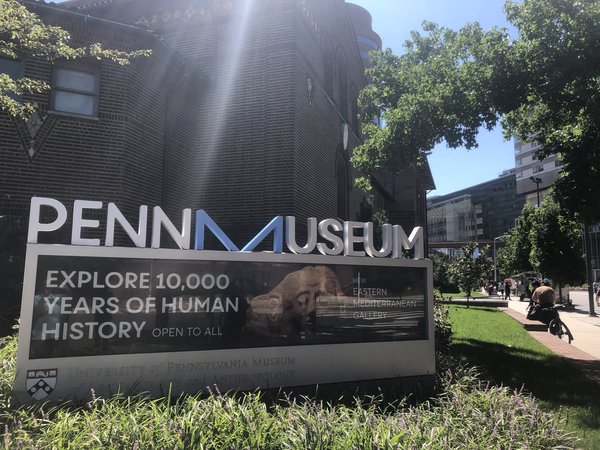Penn Museum shut its doors to the public on Thursday as a group of protesters entered the building, demanding to see the remains of Delisha Africa, one of the victims of the 1985 MOVE bombing.
The museum had returned the remains of 14-year-old Katricia Dotson, also known as Tree Africa, to her family in 2021 after news broke that the institution, at 3260 South St. on the University of Pennsylvania's campus, had retained her bones long after a Penn anthropologist was hired to help identify them in 1986. But the protesters claimed in a press conference held outside the building on around 9:30 a.m. that the museum retained additional remains, and had lied to investigators about their existence.
- MORE NEWS
- Eddie Irizarry's family says body cam footage suggests Philly police lied about his fatal shooting
- 3 Montgomery County men arrested for manufacturing and trafficking ghost guns
- Google partners with Pa. state schools to offer career-training certificates
In a statement read and distributed on Thursday, organizer Abdul-Aliy Muhammad said that Penn Museum still held one of Dotson's bones and the remains of Delisha, who was 12 at the time of the bombing on Osage Avenue in West Philly. The claims are based on photos they say were obtained from a 2014 event at Penn Museum's physical anthropology lab, in which curator Janet Monge stands by a table with bones.
The bones in the photos, Muhammad claims, match descriptions of Delisha's remains from a 1985 city report.
"Janet Monge did not turn over all the remains of MOVE children in 2021," Muhammad said. "There are still remains unaccounted for, and photo evidence that these remains were in her possession and at the Penn Museum."
After concluding the press conference, Muhammad vowed to enter the University City museum and "ask where the box is." But Lyra D. Monteiro, a Rutgers professor who was also in attendance Thursday, said she and Muhammad were barred from the building's main entrance on South Street. Upon accessing another door, "we basically had museum security kind of trying to, to push (us) out of the museum for a while," she said, before they were led into a basement office. Initially they were locked inside, Monteiro said.
"They pushed the press that were with us out of the room, even over objections, you know, to the fact that they can't do that to the press," she said on Thursday afternoon. "But at this moment, the door's open and they've told us that we can leave, but for us to leave means leaving the museum. And we're not interested in that.
"We're prepared to stay here as long as it takes."
The protesters were promised a meeting with Christopher Woods, Penn Museum's director, but as of 4:30 p.m. Thursday that had not happened.
Monteiro said at least one other protester was in the building, but on a separate floor. The front desk of the museum confirmed at 12:44 p.m. that the building was closed to the public, due to "unforeseen circumstances." On Thursday night, a Penn Museum spokesperson offered the following comment:
"Penn Museum reunited all known MOVE remains with the Africa family in July 2021. The museum has fully cooperated with all prior independent investigations and is committed to reviewing any new evidence pertaining to the MOVE remains should it emerge. University leaders met with the individuals who were at the Museum today and will investigate the information they provided to the fullest extent. We will continue to share updates at Towards a Respectful Resolution."
The museum spokesperson disputed some of Monteiro's account, saying that the individuals who entered the museum, including members of the press, remained in an office near the east entrance "of their own volition, with the door open."
Philadelphia is still grappling with the aftermath of the bombing, especially after recent scandals over the remains of MOVE members. In 2021, news broke that not only had the Penn Museum retained bones from the victims, but so had the Philadelphia Medical Examiner's Office. When that office raised the issue to Thomas Farley, the city's former health commissioner, he ordered the remains cremated without consulting the Africa family. Farley resigned in the ensuing outcry, and the remains, which were not cremated, were returned to the family.
Ramona Africa, the only living survivor of the MOVE bombing, was also at conference outside Penn Museum on Thursday morning. Breaking from the rest of the protesters, she did not call for the release of any additional remains — in fact, she refused them. After decades of mishandling, she said, she had lost faith in institutions.
"Here we are 38 years later after the bombing, and they have abused those remains," Africa said. "They have refused to give us the remains, the bones. And we don't want that, because we are not sure if that's the bones of our children. How could we be sure of that? I mean, this system, this government, this museum have played all kinds of games with people. They have lied to people.
"We don't want the bones back."
This story has been updated with a comment from Penn Museum.
Follow Kristin & PhillyVoice on Twitter: @kristin_hunt
| @thePhillyVoice
Like us on Facebook: PhillyVoice
Have a news tip? Let us know.

